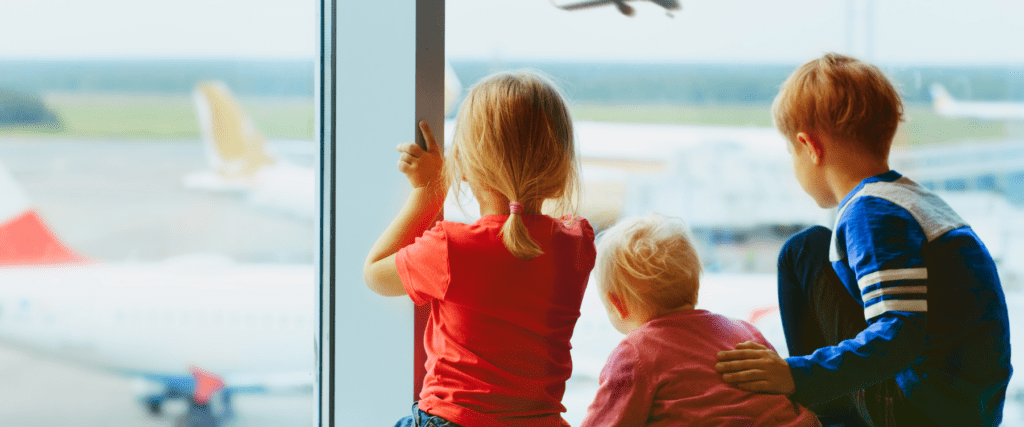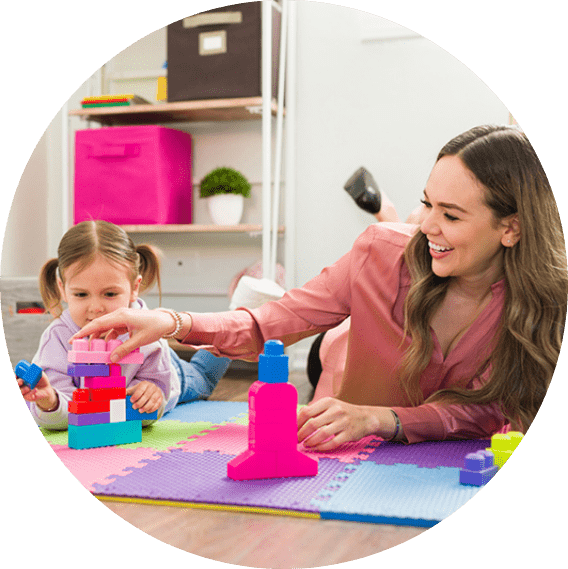From Thanksgiving to New Year’s Day and everything in between, the holiday season is one of the busiest travel times of the year. Holiday travel can be stressful and overwhelming for any family, however for neurodiverse families travel of any kind can be difficult.
Families traveling with children on the autism spectrum may be worried about their child’s sensory needs, disrupting their child’s daily routine, and a multitude of other things. However, with the right preparation and modifications, children with autism can successfully travel with their families for the holidays.
Preparing Your Child with Autism for Travel
Properly preparing your child with autism for travel is key to a successful holiday trip. Here are some things you can do leading up to the family trip to help prepare your child:
- Begin talking to your child about your travel plans well in advance. The earlier and more often you talk about the trip and what to expect the more prepared your child will be.
- Use a calendar to count down the days until you leave on your trip. Let your child mark down the days leading up to the day you leave. You can also use the calendar to help prepare your child for how long the trip will be and any planned activities during the trip.
- Whether visiting family or just getting away for the holidays, look at photos and videos of your destination with your child.
- Use social stories, videos, and other visual teaching devices to teach your child about how you will be traveling (train, plane, car, or maybe something else). This will help them learn what to expect on travel day.
Traveling by Plane
The holidays are the busiest time of year for airlines. In fact, the busiest airline travel days of the year are usually the Tuesday and Wednesday before Thanksgiving and the Sunday after Thanksgiving.
For a child with autism, the airport can be an overwhelming place filled with lots of people, loud noises, and new smells. The extra crowds during the holiday season can easily amplify these sensory experiences.
If your family will be traveling by airplane this holiday season be sure to keep these things in mind:
- When booking a flight, look for flights that align with your child’s sleep schedule. That can be an overnight flight or if your child still naps, a flight that overlaps with their normal naptime. This may help limit the disruption to your child’s normal routine by allowing them to sleep through part, if not all, of the flight.
- Contact the airline and airport in advance to let them know that you are traveling with a person with autism and the specific challenges they may face while traveling. Some airports and airlines have different resources, supports, or options for travelers with special needs.
- Book a flight with the option to select your own seats. You want to make sure that you will be sat with your child.
- No matter a child’s age or disability, everyone will need to be screened by TSA. Be sure to let security know about your child’s needs and click here to learn more about TSA Cares, a TSA program designed to assist travelers with disabilities who may need additional assistance with screening.
- Board first or last. Many airlines have the option for families with special needs travelers to board first. This will give you a chance to settle in with your child before everyone else boards. If you can’t board first, boarding last is an alternative option. Boarding last may make it easier and less overwhelming for your child, compared to boarding among a crowd of other passengers.
- Be prepared to help your child with ear pressure. A child with autism may be even more sensitive to the pressure in their ears and ear popping that can occur during take-off and landing. Depending on your child’s age and abilities use chewing toys, chewing gum, or candy they can suck on to ease the discomfort.
- Give yourself lots of time. Long lines, extra traffic, and changing terminals are just a few of the things that can delay travel at the airport. Travel days are already stressful enough, avoid the panic of a potential missed flight and be sure to pad your travel day with as much time as possible. Arrive at the airport extra early and if you will need to transfer flights, make sure to choose a flight with plenty of layover time.
First-Time Flyers
If this is your child’s first time traveling by plane and visiting an airport, try to work in some time for a trial run before your actual travel day. Although you may not be able to visit all parts of the airport without a ticket, a visit to the airport in advance can help your child prepare for some of the sights and sounds. They can watch how the different lines work, use the airport restroom, and ride the parking lot shuttle. You can also use this time to point out different areas and workers at the airport, like security.
Wings for Autism is a great program that can help coordinate airport “rehearsals” for children to practice traveling at the airport. With this program, they can practice going through security, waiting in line, and boarding a flight. Not all airports participate in this program. If your airport isn’t one of them, you may want to consider giving them a call just to see if they can offer any kind of practice options for your family.
If you aren’t able to visit the airport in person prior to your flight, role-playing is also a great way to help prepare your child beforehand. Act out different parts of the airport experience, like waiting in line and security screening.
Traveling by Car
Many families may choose to skip the airport congestion and opt to take a family road trip during the holidays. Whether traveling just a few hours or all day here are some things to help make your holiday car ride an enjoyable experience for your family:
- If you are traveling with a child who requires a car seat or booster seat make sure the devices are properly installed. Poorly installed seats are not only a safety risk but can also make a child uncomfortable.
- Make sure your car is ready for a long road trip. Change the oil, check the brakes and battery, take care of any maintenance lights you may have been avoiding on the dashboard, and if you aren’t mechanically inclined consider taking your car to a professional for an inspection and or tune-up.
- If your child isn’t used to long car rides, try taking short trips before the big travel day to help ease your child into long car rides. Easing your child into long car rides will help them practice riding in the car and will help you prepare for the things your child may need or potential problems that may arise.
- Make an itinerary for your time on the road. Be sure to schedule bathroom breaks and meal times. Although things like traffic and emergency bathroom breaks can make car travel longer than anticipated, creating a detailed itinerary can help your child with autism understand what the trip will look like and can help you answer the unavoidable question of “Are we there yet?”
- While making your itinerary be sure to schedule ample breaks. Plenty of breaks will give your child a chance to get up and move around and avoid the overstimulation that can come with long car rides.
- Children with autism prefer routine. If your child can sleep well in the car, consider traveling at night to avoid interrupting your child’s routine too much.
Lodging
Whether you will be staying with family or not here are some things to keep in mind when planning your holiday lodging accommodations:
- If staying at a hotel, ask for a room at the end of the hall and away from elevators, swimming pools, and other noisy areas.
- Look for hotel options with sensory-friendly rooms and accommodations.
- As an alternative to hotels, check sites like Airbnb for vacation rentals. A vacation rental may give you a bit more control over noise and with your own kitchen, you can easily prepare your own meals. Great if your child is a picky eater or has specific dietary needs.
- If you will be staying with family, consider asking your host to share with you pictures of their home and the room you will be staying in. This will help prepare your child for what to expect.
- In a new environment, a child with autism could easily become overstimulated and dysregulated. No matter where you are staying, identify a quiet space for your child to “escape” to whenever they are feeling overwhelmed or need to relax. Have at the ready things like headphones, toys, and anything else that helps your child regulate themselves in this space.
General Travel Tips for Neurodiverse Families
- Be sure to bring your own necessities. Even if you are visiting close family or friends, never assume that they will have the things your child needs. Bring their comfort items, favorite snacks, a good blanket and pillow, fidget toys, or anything else you think they may need.
- Avoid washing comfort items right before a trip. Traveling can be overwhelming and dysregulating, but having an item that smells like home can help soothe a child.
- Create a visual schedule for every day of your trip to help prepare your child for what to expect on any given day while they are away from home. This may help your child adjust to the unfamiliar schedule and routine that can come with travel.
- No matter how you will be traveling, food options can be limited. If your child has any food allergies, food sensitivities, or is a picky eater be sure to pre-pack meals and snacks for the trip.
- Get some exercise before you leave. Long car rides, long airplane rides – travel often requires long periods of sitting. Help your child burn some energy with high-motor activities like running or jumping. Or why not have a family dance party?
- Provide a visual timer for travel times. This is a great option for flights, but can work in the car too. Giving your child a countdown timer will help them understand how much longer the flight or car ride will be.
- Things will change when you travel. Whether it is a delayed flight, unusual traffic, or something else, you need to be prepared for plans to change. Avoid the panic of not knowing what to do by coming up with a plan B, C, and maybe even D before your trip.
- Children with autism prefer routine so try to stick to their regular routine as much as possible. Even though you will be in a new location, try to eat meals at the same time as you would at home and keep bedtime and morning routines as standard as possible.
- Entertainment will make your travel time so much easier. Be sure to bring tablets, laptops, music, headphones, books, games, toys, and whatever else you need to keep your child entertained while traveling. Make sure to pack charging cables, extra batteries, and several different entertainment options.
Happy holidays and safe travels!




